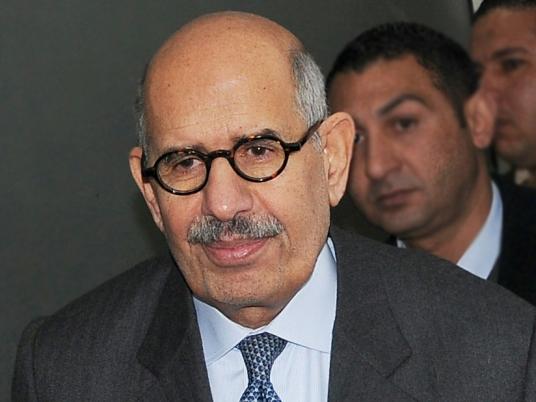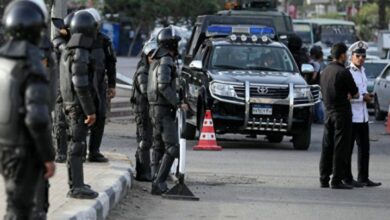The Emergency Law has returned to full effect, however, according to state-run Al-Ahram, Field Marshal Hussein Tantawi has promised to get rid of it as soon as possible. Independent Al-Shorouk, on the other hand, says the lifting of the Emergency Law will depend entirely on the country's security situation.
Both Al-Ahram and Al-Shorouk quote Tantawi, however, Al-Ahram quotes him as implying that the Emergency Law is meant to curb rape, kidnappings and a lack of security in people's homes. In both papers, Tantawi says the law will only end when there is “a return of stability” in Egypt.
He made the statements while inaugurating a military road in the Upper Egypt governorate of Minya. Tantawi has been opening other military facilities this week and spoken uncharacteristically forcefully about the role of the military in paving the way for a better future, according to state-run Al-Akhbar.
Political parties that signed an agreement expressing support for the Supreme Council of the Armed Forces (SCAF) on Saturday are reportedly suffering internal repercussions and discord as a result. Independent Al-Tahrir says many of these parties are experiencing infighting, as well as fighting between parties that were working together until recently, such as the Freedom and Justice Party and the Wafd Party. Thirteen parties signed the agreement, which essentially affirms faith in the SCAF and addresses certain reform measures, such as setting a timeline to end the Emergency Law and declaring an end to military trials.
Yet the statement also agrees to prolong military rule until the end of 2012 or possibly even the beginning of 2013, at least six months longer than what had been previously expected. All seven major presidential hopefuls have all called on the SCAF to hand over power to a civilian authority by mid-2012, Al-Akhbar says.
Speaking of presidential candidates, the longest-serving foreign minister of the Mubarak regime, Amr Moussa, gives an interview in Al-Shorouk in which he reportedly said, “People won’t bring back old faces from the dissolved [National Democratic Party].”
Mohamed Abul Ghar, head of the Egyptian Social Democratic Party, signed onto the agreement yesterday only after the SCAF agreed to amend the clause declaring full support and faith in the SCAF and its decisions, reports Al-Akhbar.
Many party members who signed the agreement will be subject to an intra-party investigation, according to Al-Shorouk.
Al-Tahrir and Al-Shorouk report that presidential hopeful Mohamed ElBaradei's National Association for Change says this agreement and the SCAF’s new statement is reason enough for Egyptians to head out for another round of mass demonstrations in Tahrir this coming Friday. Moussa expresses concern in party-run Al-Wafd that extending the transitional period will have dire consequences for Egypt's economy.
Preparations for parliamentary elections, on the other hand, seem to be going smoothly, as the High Elections Commission has already decided 12 October will be the day candidates officially can register their candidacies. The first round of elections will begin on 28 November, Al-Wafd reports.
Protests around the country continue, especially in the public sector. The Public Transport Authority strike is entering its 17th day, according to Al-Akhbar, as its workers continue to demand higher wages.
Protests and boycotts at five major public universities also continue, as protesting students and faculty demand the removal of old deans and department heads, claiming they had been appointed by the Mubarak regime’s dreaded State Security Investigation Services, says Al-Tahrir. Al-Wafd reports university heads have been given a 72-hour ultimatum to step down or else they will not be allowed to return to their offices. Students and professors from Egypt’s second-largest university, Ain Shams, are among the five universities participating in the boycott. Cairo University is fully functioning, Al-Ahram says.
In economic news, Al-Wafd quotes Central Bank Governor Farouk al-Oqda as saying foreign and local debts are the highest in the history of the country. The paper's headlines read more startlingly, “Egypt is on the brink of bankruptcy.” Al-Wafd quotes analysts who believe debt is crippling the Egyptian economy and the only solution is to increase production.
Finance Minister Hazem al-Beblawy said the government does not have the resources to respond to workers’ demands at the moment, Al-Shorouk says. At the same time, the National Council for Wages will enforce a 7 percent raise and minimum wage in the private sector as early as next week, according to Al-Akhbar.
Al-Tahrir seems to think Alaa al-Aswany is a serious contender for this year’s Nobel Prize in Literature.
Al-Akhbar’s all-important page two has some important cultural news, as always. Apparently British actress Elizabeth Hurley is going to get married to a famous cricket player. The paper also mentions that Catherine, Duchess of Cambridge, better known as Kate Middleton, raised many questions recently when she appeared without her wedding ring on. (But wait! Weren't William and Kate in love?)
Thank God for Al-Akhbar’s page two, which then cleared the air. A friend of Kate and William puts everyone's mind at ease by saying that Kate had to take off the ring for safety reasons. Thank you, page two of Al-Akhbar.
Egypt's papers:
Al-Ahram: Daily, state-run, largest distribution in Egypt
Al-Akhbar: Daily, state-run, second to Al-Ahram in institutional size
Al-Gomhurriya: Daily, state-run
Rose al-Youssef: Daily, state-run
Al-Dostour: Daily, privately owned
Al-Shorouk: Daily, privately owned
Al-Wafd: Daily, published by the liberal Wafd Party
Youm7: Daily, privately owned
Al-Tahrir: Daily, privately owned
Sawt al-Umma: Weekly, privately owned
Al-Arabi: Weekly, published by the Arab Nasserist party




